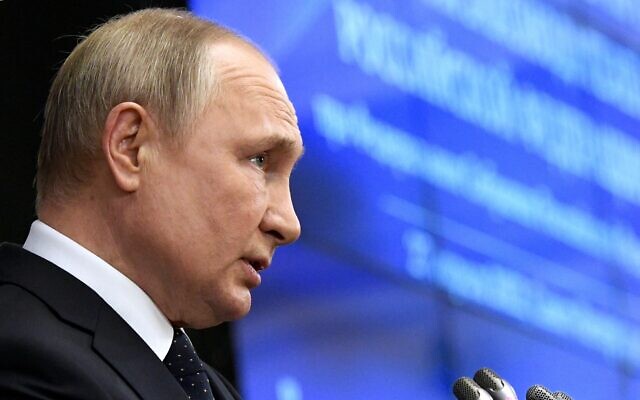
Zelensky and Putin double down on mutual Holocaust, Nazi comparisons
Ukrainian President Volodymyr Zelensky and Russian President Vladimir Putin renewed their comparisons to the Holocaust and Nazism as they traded accusations over Russia’s invasion of its neighbor, in messages Sunday to memorialize the end of World War II.
Zelensky posted a video on Facebook to mark Ukraine’s Day of Remembrance and Reconciliation, held annually on May 8 since 2015, and observed to honor lives lost in conflicts such as World War II.
In the 15-minute black-and-white video, Zelensky is seen standing in the ruins of the town of Borodyanka, where an estimated 200-400 people were killed when the Russian army advanced on Kyiv early in the war. Throughout the video, Zelensky highlights what he says is the modern irrelevance of the slogan “Never again.”
“On February 24, the word ‘never’ was erased, shot and bombed, by hundreds of missiles at 4 a.m., which woke up the entire Ukraine,” Zelensky says. “We heard terrible explosions. We heard: Again!”
During the video, Zelensky compares major bombardments by the Luftwaffe during World War II of Warsaw in Poland and Coventry in England to current waves of destruction witnessed in Ukrainian cities such as Kharkiv and Mariupol.
Zelensky also laments that cities that witnessed the Nazi occupation were witnessing occupation for the second and third time in their history. “And our cities, which survived such a heinous [Nazi] occupation, that 80 years was not enough time to forget, saw the occupier again,” he said.
This year, we say “Never again” differently. We hear “Never Again” differently. It sounds painful, cruel. Without an exclamation, but with a question mark. You say: never again? Tell Ukraine about it.Eternal honor to all who opposed Nazism!Eternal memory to all those killed during the Second World War!#ніколизнову #neveragain #stoprussia #standwithukraine #supportukraine #ukraine #україна
Posted by Володимир Зеленський on Saturday, May 7, 2022
“During the two years of occupation, the Nazis killed 10,000 civilians there [in Mariupol]. In two months of occupation, Russia killed 20,000,” he added, citing an unconfirmed death toll in the heavily bombarded southern coastal city.
Zelensky, who is Jewish, came under fire in Israel for comparisons between his country’s struggle and the Holocaust, after a speech he made to the Knesset in March.
“The Russians use the terminology of the Nazi party, they want to destroy everything. The Nazis called this ‘the final solution to the Jewish question,’” he said at the time. “And now… in Moscow… they’re using those words, ‘the final solution.’ But now it’s directed against us and the Ukrainian question.”
Meanwhile, Russia’s Putin vowed that “as in 1945, victory will be ours” as he congratulated former Soviet nations on the 77th anniversary of Nazi Germany’s defeat in World War II.
“Today, our soldiers, as their ancestors, are fighting side by side to liberate their native land from the Nazi filth with the confidence that, as in 1945, victory will be ours,” said Putin, who sent Russian troops into Ukraine in February.

Russian President Vladimir Putin addresses a meeting of the Council of Legislators under the Russian Federal Assembly at the Tauride Palace, in St. Petersburg, Russia, on April 27, 2022. (Alexei Danichev, Sputnik, Kremlin Pool Photo via AP)
“Today, it is our common duty to prevent the rebirth of Nazism which caused so much suffering to the peoples of different countries,” said Putin. He added he hoped “new generations may be worthy of the memory of their fathers and grandfathers.”
Putin also made multiple references not just to soldiers but also civilians on the “home front… who smashed Nazism at the cost of countless sacrifices.”
“Sadly, today, Nazism is rearing its head once more,” charged Putin, who has insisted that Ukraine is in the grip of fascism and a threat to Russia and the Russian-speaking minority in Ukraine’s east that Moscow claims to be “liberating.”
He also said he wished “all Ukraine’s inhabitants a peaceful and just future.”
On Monday, Moscow will officially commemorate victory over Nazi Germany with a giant military parade.
Under Putin, Russia has justified its offensive in Ukraine, launched on February 24, as a “special operation” to “demilitarize” and “de-nazify” its neighbor, a former Soviet republic that declared independence in 1991.
